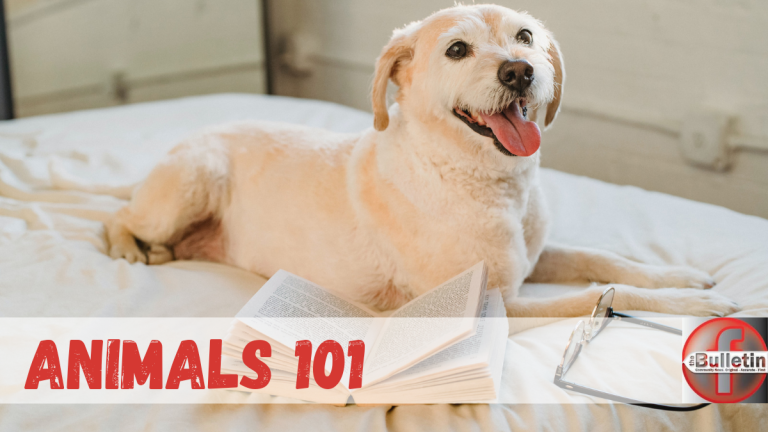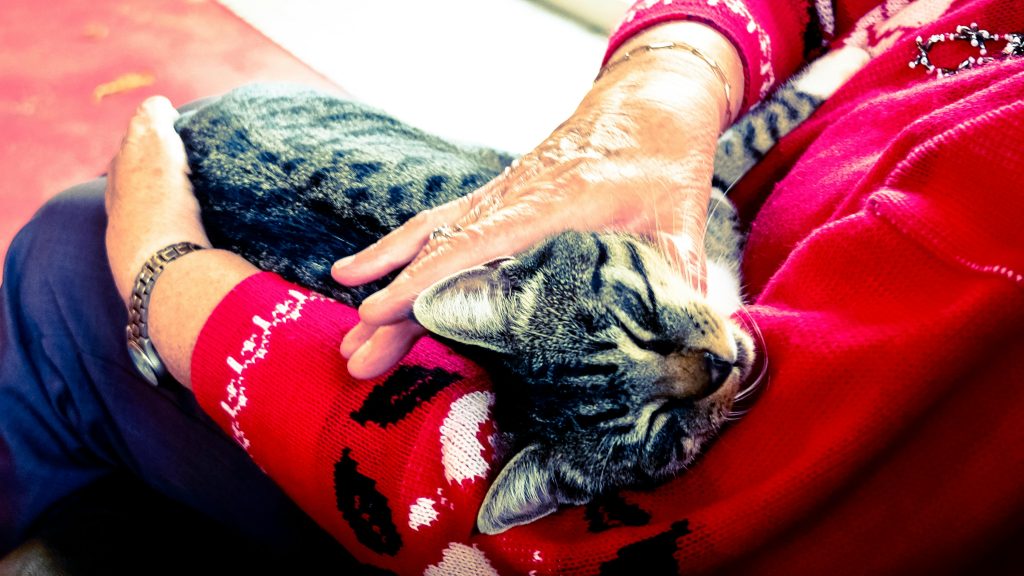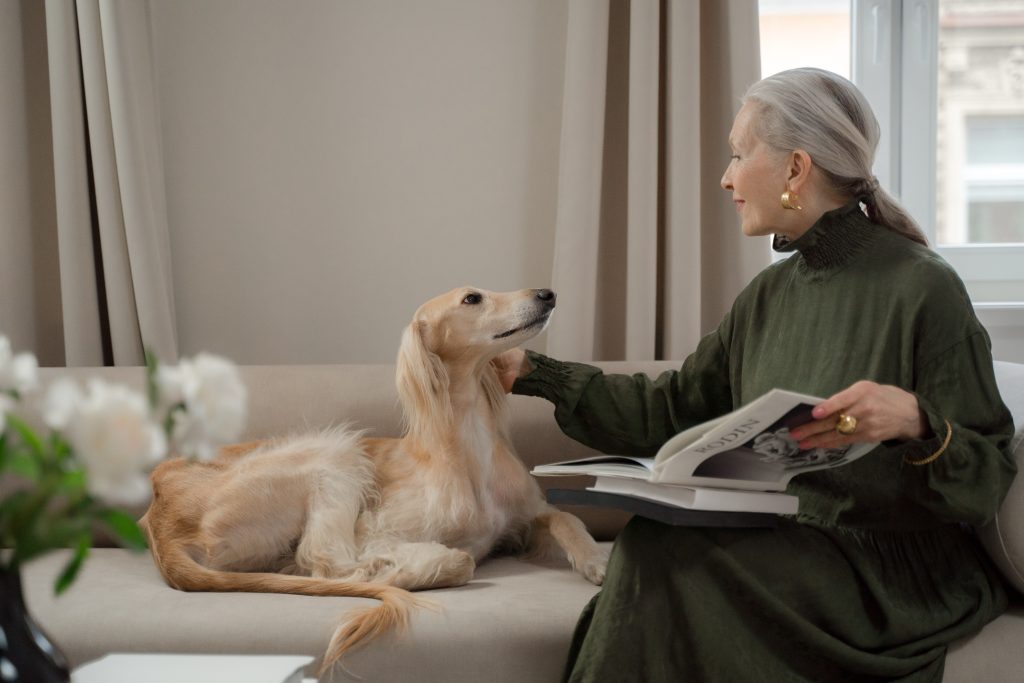
WHY BUYING ANIMALS FOR THE ELDERLY CAN BACKFIRE.
Gifting a pet to an elderly parent or loved one may seem like a thoughtful gesture aimed at providing companionship and alleviating loneliness. However, the reality of pet ownership often reveals a more complex picture. While animals can indeed offer joy and solace, and have a positive effect on health, introducing a pet into an elderly person’s life requires careful consideration. Unfortunately, even registered animal welfare organizations make mistakes regarding this. The mismatched needs and capabilities can lead to unintended consequences for both the pet and the elderly owner. This article explores why gifting pets to seniors can be problematic, addressing the challenges of care, physical demands, and long-term responsibilities.
Also, read why an animal should never be a surprise gift for anyone!

UNDERSTANDING THE COMPLEXITY OF PET CARE
The belief that a pet is a simple solution to loneliness is a common misconception. Each animal demands specific care, attention, and resources that may be challenging for an elderly person to provide. For example, puppies or active dogs, like Jack Russells (being a popular breed), require substantial training, exercise, and supervision. Their high energy levels and need for interaction can quickly become burdensome rather than beneficial. Birds, often perceived as low-maintenance, also present unique challenges. They need proper diet, social interaction, and mental stimulation despite their confinement to a cage. Without adequate care, birds can suffer from stress, poor health, and behavioural issues.
- Physical and Emotional Demands
The physical demands of pet ownership can be particularly taxing for seniors. Large or strong breeds might inadvertently cause accidents, such as tripping their owner or knocking them over. Even smaller, active breeds can pose risks if they require more exercise than the elderly owner can provide. Additionally, the emotional stress of caring for a pet can be significant. Tasks like walking a dog, cleaning up after an animal, or managing behavioural problems can lead to increased stress, anxiety, and physical strain, undermining the intended benefits of companionship.
2. Financial Implications
The financial responsibilities of pet ownership are often underestimated. Costs associated with food, veterinary care, grooming, and other essentials can quickly add up, creating a burden for seniors on fixed incomes. We often get requests to help with vet bills because it is a pensioner or to help get the animal to the vet, because the elderly caregiver can’t take them for various reasons. Emergency veterinary care or unexpected health issues for the pet can further strain finances. Long-term financial planning is also crucial. Without a clear plan for the pet’s care in the event of the senior’s incapacity or passing, the pet’s future can become uncertain, leading to potential neglect or rehoming.
3. Health and Safety Concerns
- Potential Health Risks: Pets, particularly dogs and cats, can pose health risks to elderly individuals, including allergies, zoonotic diseases (diseases transmitted from animals to humans), and infections. Seniors with compromised immune systems or existing health conditions may be more susceptible to these risks.
- Physical Safety: Active pets, such as young dogs or large breeds, can unintentionally cause accidents or injuries. For instance, a playful dog might pull on a leash too hard, causing the owner to fall. Pets requiring frequent outdoor exercise or trips to the vet can pose additional risks, especially if the senior has mobility issues.
4. Emotional and Psychological Impact
- The Burden of Care: Owning a pet can be emotionally overwhelming for some elderly individuals. The constant need for attention, the responsibility of meeting the pet’s needs, and managing behavioural issues can lead to stress and anxiety, detracting from the intended comfort and companionship.
- Impact of Loss: The emotional toll of losing a pet can be profound, especially if the senior forms a strong bond with the animal. The grief of losing a pet, combined with the stress of rehoming or arranging care, can exacerbate feelings of loneliness and depression. Keep in mind that the animal may also experience the loss of their owner and then having to live with a stranger if the family can’t take them in.
If a pet is being considered, providing educational resources and support about pet care can help ensure preparedness for the responsibilities involved. Workshops, guides, and consultations with veterinarians or animal care specialists can be invaluable.

ALTERNATIVES TO PET OWNERSHIP
Community Programs: Many communities offer programs that match volunteers with elderly individuals for regular visits. These programs provide social interaction and companionship without the need for full-time pet ownership. Therapy animal programs can also bring joy to seniors without the responsibilities of caring for a live animal.
Other activities: There are numerous enriching alternatives to pet ownership that can keep elderly individuals engaged and active. Mental stimulation can be achieved through activities like jigsaw puzzles, crossword puzzles, and brain-training apps, which challenge cognitive abilities and provide enjoyable problem-solving opportunities. Creative pursuits such as painting, knitting, or writing offer self-expression and artistic fulfillment. Educational activities, including online courses and workshops, contribute to personal growth. Social interaction can be fostered through board games, card games, social clubs, and volunteering, providing a sense of community and purpose. Physical wellness can be maintained with chair exercises, yoga, and gardening. Digital media, including streaming movies, listening to music, and engaging in virtual socializing, offers entertainment and connection.
Companion Animals: Robotic pets or interactive companions designed for seniors can provide the emotional benefits of a pet without the physical and financial demands. These devices can offer companionship and mental stimulation without requiring extensive care.

PREPARING FOR THE FUTURE
Creating a Care Plan: If a senior already owns a pet or is considering one, developing a comprehensive care plan is essential. This plan should include provisions for the pet’s care in case of the senior’s incapacity or passing, such as identifying a family member or friend to take over responsibilities and ensuring financial and logistical arrangements are in place.
Since the system is so overwhelmed and there are already not enough homes, especially with old pets, I suggest that the caretakers take them to the vet for euthanasia instead of dumping them on an already overwhelmed system. Unfortunately, the reality is that it is harder to find homes for older pets who may come with higher expenses due to illness.
Legacy Considerations: Discussing and planning for the pet’s future as part of the senior’s estate planning can help mitigate uncertainties. Establishing a pet trust or making arrangements with animal rescue organizations for rehoming can provide peace of mind and ensure the pet’s needs are met in the long term.
If you have given a pet to an elderly parent, please take responsibility for that animal and plan for their future. Are your pets included in your will? Read more about this topic here.
Gifting a pet to an elderly individual requires careful consideration and planning. While the intention may be to provide companionship, the physical, emotional, and financial realities of pet ownership must be thoroughly evaluated to ensure a beneficial arrangement for both the elderly person and the pet. By understanding the complexities involved and exploring alternative solutions, we can better support seniors in their quest for companionship while safeguarding the well-being of their animal companions. This thoughtful approach helps avoid the pitfalls of well-intentioned but poorly planned pet gifts, ensuring a fulfilling and harmonious relationship for both the elderly individual and their pet.
Next week we will look at why we need the public to step up and how they can help.
WHEN YOU KNOW BETTER, DO BETTER!